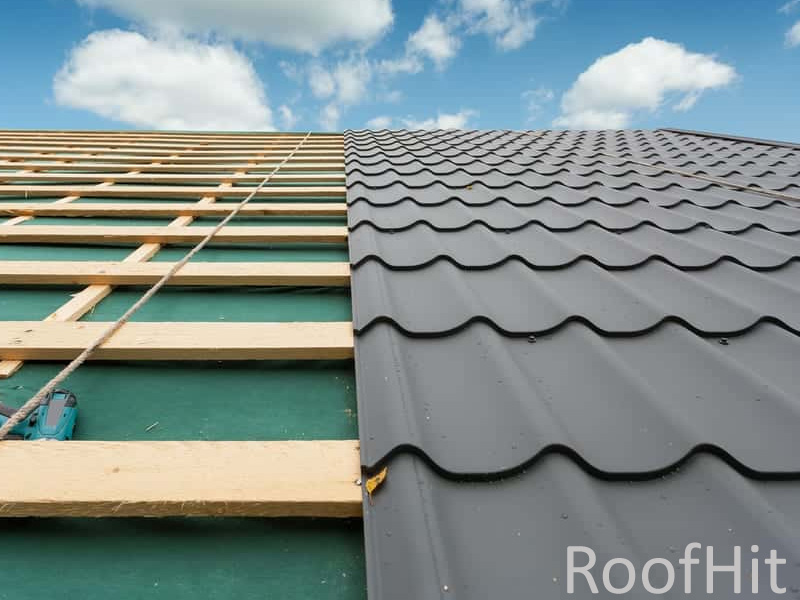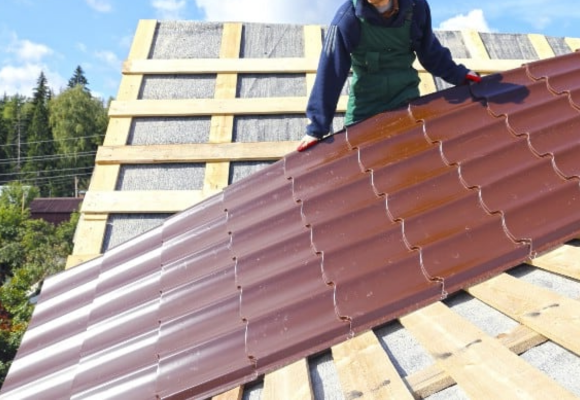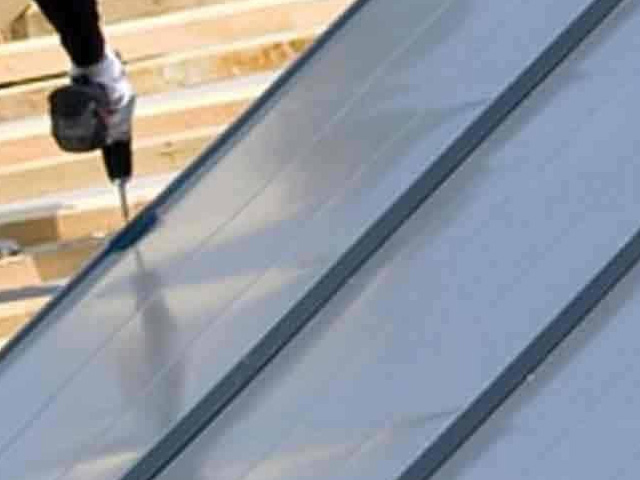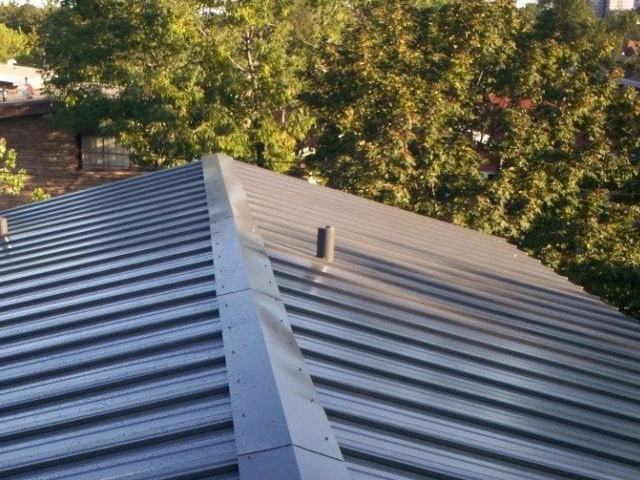Metal roofing has gained popularity in recent years for residential and commercial buildings.
This roofing option has many benefits, but weighing these against the drawbacks is essential before deciding.
This article aims to provide a detailed analysis of the pros and cons of metal roofing to help potential buyers make an informed choice.
Advantages of Metal Roofing
Longevity
One of the most appealing features of metal roofing is its durability and long lifespan.
When installed correctly, a metal roof can last between 40 and 70 years, far outlasting traditional asphalt roofing, which generally lasts only 12 to 20 years.
Energy Efficiency
Metal roofing is highly energy-efficient, especially in warmer climates. Its reflective surface minimizes heat absorption, reducing cooling costs during summer.
Some specialized coatings can re-emit absorbed solar heat, enhancing your home’s energy efficiency.
Environmentally Friendly
Metal roofs are often manufactured from recycled materials, and at the end of their lifespan, they are 100% recyclable.
This eco-friendly attribute can contribute to building certifications like LEED and significantly reduce your home’s environmental impact.
Low Maintenance
Another perk of metal roofing is its low maintenance requirements. Unlike roofs made from asphalt or wood, metal roofs are not susceptible to rot, insects, or mildew.
An occasional cleaning and inspection are generally all needed to keep a metal roof in good condition.

Safety Features
Metal roofs are non-combustible and typically have a Class A fire rating, the highest available.
This characteristic makes them a safe choice, particularly in areas where wildfires are a concern.
Wind Resistance
Due to their sturdy construction and interlocking panels, metal roofs are highly wind-resistant able to withstand gusts up to 140 miles per hour.
This makes them an excellent choice in hurricane-prone areas.
Versatility in Design
While not as varied as other roofing materials, modern metal roofing does come in multiple styles, textures, and colors, enabling homeowners to choose options that complement their home’s architectural style.
Lightweight
Metal roofs are lighter than other roofing materials like tile or asphalt, so they put less structural stress on your home.
This is especially beneficial for homes that cannot support heavier roofing materials.
Resale Value
Investing in a metal roof can significantly increase your home’s resale value. The longevity and low maintenance of metal roofs are selling points that prospective buyers often appreciate.
By evaluating these advantages, homeowners and building owners can decide whether metal roofing is the right option for their needs.
Disadvantages of Metal Roofing
Initial Cost
Metal roofing is generally more expensive upfront compared to other roofing materials. However, the long-term benefits often offset these initial costs.
Noise Factor
Rain or hail on a metal roof can be louder than on other types of roofing. Insulation can mitigate this, but it’s an additional cost to consider.

Denting
Although metal roofs are tough, they can still be dented from severe hail or falling tree limbs. Some types of metal roofing materials are more prone to this than others.
Limited Aesthetic Options
While metal roofing comes in various styles and colors, the choices are not as abundant as other materials like asphalt shingles. This limitation could be a turn-off for those who have specific aesthetic preferences.
Expansion and Contraction
The metal expands and contracts with temperature changes. Over time, this can lead to a “wavy” effect if not properly installed, which may require adjustments.
Which One Is Better: Metal Roofing or Traditional Roofing?
Deciding between metal and traditional roofing involves thoroughly evaluating various factors, from cost to longevity to aesthetic preferences.
Below are some points to consider when making this important decision.
Cost
While metal roofing generally has a higher upfront cost, it offers long-term value with lower maintenance and potential energy savings.

Traditional asphalt roofing is initially cheaper but may require frequent replacement and repairs.
Longevity
Metal roofing boasts a lifespan of 40 to 70 years, considerably longer than traditional asphalt shingles, which typically last about 12 to 20 years.
Maintenance
Metal roofing requires minimal upkeep, primarily occasional cleaning and inspections.
Traditional roofing materials like asphalt or wood may require frequent maintenance, including re-shingling and dealing with moss and algae growth.
Energy Efficiency
Metal roofs are superior in reflecting solar heat, making your home more energy-efficient, especially in hot climates. Asphalt roofs do not offer the same level of energy savings.
Environmental Impact
Metal roofing is often made from recycled materials and is fully recyclable at the end of its life. Asphalt shingles are less eco-friendly, as they are a petroleum-based product and often end up in landfills.
Safety
Metal roofs have a Class A fire rating and are non-combustible, making them a safer choice in areas prone to wildfires. Traditional roofing materials do not generally offer the same level of fire resistance.
Aesthetics
While metal roofing options have expanded recently, traditional roofing materials still provide a broader range of styles and colors. Your aesthetic preference may be a significant factor in your decision.

Installation
Metal roofing can be quicker to install but requires specialized knowledge and skills. Traditional roofing materials are commonly used and easier to install but may take longer.
Resale Value
Homes with metal roofs often have a higher resale value due to the material’s longevity and low maintenance. Asphalt roofing doesn’t have the same selling point, especially if it is near the end of its lifespan.
Conclusion
Metal roofing offers a range of benefits, including longevity, energy efficiency, and low maintenance. However, it has drawbacks, such as higher initial costs and potential noise issues.
When considering a metal roof, it’s crucial to evaluate the advantages and disadvantages to determine if it’s the right choice for your needs and circumstances.
Neither metal nor traditional roofing is better; the better choice depends on your needs, priorities, and budget.
However, metal roofing has a distinct edge if you want durable, environmentally friendly, and energy-efficient roofing.
On the other hand, if upfront costs are your primary concern and you prefer a more traditional appearance, asphalt or other conventional materials may be more suitable for you.

Arthur is a skilled roof worker with over 10 years of experience in the industry. He started his career as an apprentice and worked his way up to become a foreman.
When he’s not working on roofs, John enjoys with his family or writing posts. He is also a passionate cyclist.

